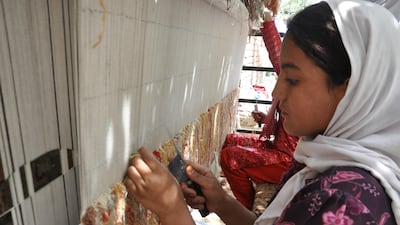While it’s no secret to my family and friends that I don’t particularly enjoy wandering around malls, there are occasions when I feel it’s worthwhile because of new insights gained.
This weekend was one such occasion because I visited the carpet shop of the Fatima bint Mohamed bin Zayed Initiative (FBMI) at Yas Mall.
The project, a partnership with Tanweer Investments in Afghanistan, offers a framework whereby low-income Afghan women, many of them widows, use traditional skills to produce carpets that are then sold in the UAE, and now in London and New York.
The FBMI complements this by providing access to vocational training and healthcare, as well as education for their children. The wool, cotton and vegetable dyes used for the carpets are sourced from local suppliers, spreading the economic benefits more widely throughout the community. Through selling the carpets, the FBMI pursues its objective of being both commercially viable and sustainable.
According to an FBMI brochure, more than 10,000 carpets have been produced, more 3,000 people are employed, and in excess of 7,000 children are receiving education. Quietly, without much publicity, the FBMI is helping to change lives for the better. “The numbers give a sense of scale,” the brochure notes, “but it is the light in the eyes of the people involved that tells the real story.”
Such low-key projects in developing countries, often overlooked, are of fundamental importance.
Another such project, of which I learned last month, is an initiative launched by the Royal Jersey Agricultural and Horticultural Society (RJAHS) in collaboration with the government-run Jersey Overseas Aid (Joa).
_________________
Read more
UAE’s charitable causes in Afghanistan will not stop
Afghan women’s magic carpet company
Sheikha Fatima's initiative gives Afghans hope
_________________
The world-famous Jersey cow produces much more milk than most other breeds. For over a decade, the RJAHS and Joa have been working with the government of Rwanda to increase milk yields in the East African country. The Rwandan Ankole cow produces between 1 and 2 litres of milk a day. A first generation cross between an Ankole and a Jersey cow produces an average of 12 litres a day, while a second generation cross (75 per cent Jersey and 25 per cent Ankole) averages 16 litres a day.
The project involves sending Jersey bull semen to Rwanda and training Rwandans in artificial insemination techniques. Thereby, more milk is produced, benefiting subsistence farmers and producing a surplus to help in the development of the local dairy industry.
In 2006, when the project began, Rwanda's annual milk production was 130 million litres. By the end of this year, it is expected to be 730 million litres, with around 350,000 families benefiting.
As JOA’s chairman, Carolyn Labey, notes: "This is sustainable development at its best. We should be enormously proud of the fact that we are making a permanent improvement to the quality of an entire nation's dairy herd, and in so doing assisting many people out of poverty with better nutrition and on to better lives."
_________________
More from Peter Hellyer
Why the UAE needs to invest more in environmental research institutions
Flower power and the possibilities of civic engagement
Our country works quietly all the time to build a better life for people all over the world
_________________
Volunteers from Jersey also visit Rwanda to share their skills in construction, in agriculture and other spheres. This year’s team completed a three-week mission last weekend, having helped a village to improve its water supplies and sanitation. There are similar volunteer projects here too, like one run by a friend of mine to help a school in Nepal, though we hear little of them.
Whether the result of personal or government initiatives, such projects enrich lives and offer new hope to some of the world’s most disadvantaged people.
We hear much about the millions of people, in the Middle East and elsewhere, who are refugees or displaced and much, too, about the billions of dirhams provided by the UAE and other countries in various forms of relief assistance. At times, the numbers are so huge that it's easy to lose sight of the stories of human suffering and deprivation that they represent.
From carpets to cows, it’s good to learn of the impact that such small scale development initiatives have on real lives.
Peter Hellyer is a consultant specialising in the UAE’s history and culture
Follow The National's Opinion section on Twitter


